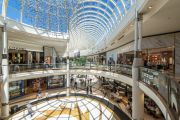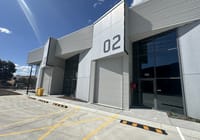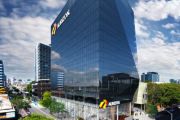
Young property entrepreneur gets set in green concrete start-up
Commercial property entrepreneur Oscar Ledlin has launched a new company turning recycled glass into a more sustainable ingredient for production of concrete, amid increasing attention on the environmental impact of the building sector.
The Young Rich Lister ranked 55th on this year’s Financial Review Young Rich List with a net worth of $123 million, underpinned by his property development business Ledlin Group. He launched Sustainable Concrete Group last year alongside co-founder Brendan Lloyd and partner Marco Fabrizio.

Concrete is created using water, cement and aggregates, including sand and crushed stone. The business transforms recycled glass waste into engineered sand as a replacement for natural sand, which is often dredged from oceans and rivers, causing ecological harm.
The waste glass is put into a vortex–type machine and forced downwards at about 400 kilometres an hour, in a process that crushes the glass into a sand-like substance.
The start-up has been established as the building industry – and wider property sector – faces increasing pressure to account for its greenhouse gas emissions and to reduce its impact on the environment. A wave of innovation in green building materials has followed as suppliers and manufacturers try to meet sustainability standards.
Ledlin said the NASA-developed technology employed in the process was acquired through a contact based in South Africa, who gave the group a worldwide provisioning licence for it.
“So far, we’ve tested up to 40MPa [megapascal], which is considerable-strength concrete suitable for precast panels, all sorts of different foundations, bridges, walls and the like,” he told The Australian Financial Review.
“No one else is doing this in the market at the moment, I’m sure there will be,” he said. “We want to be a first adopter and get sufficient scale that we can get ahead of the market.”
Sustainable Concrete Group has developed partnerships with O’Brien Glass, National Windscreens and local councils to divert glass away from landfill to its glass recycling plant in Dandenong South, in Melbourne’s south-east. The group is also in the process of establishing plants in Brisbane and Sydney.
Another arm of the company is focused on acquiring 50 per cent stakes in civil, concrete and building businesses, and implementing its sustainable sand into their concrete production.
So far, five businesses now operate under the group with a combined annualised revenue above $100 million and EBITDA of more than $22 million.
“If the glass or our sand works for them, we supply them, help them win tier one and government tenders, and grow the value of their businesses as well, and for us, continue getting further reach of our product,” Ledlin said.
Sustainable Concrete Group is on track to exceed a value of $150 million and has IPO hopes for the future. It recently closed out a Series A seed funding round at a valuation of $100 million.
Innovation in concrete production is proliferating in Australia and beyond.
One of the country’s top concrete manufacturers Boral has produced a range of low-carbon concrete that uses recycled materials, replacing high-carbon-emitting Portland cement with byproducts such as fly ash, slag and calcined clay – otherwise known as supplementary cementitious materials (SCMs).
Cement Australia, one of the nation’s biggest cement suppliers, is also employing similar tactics to reduce the effect its cement production has on the environment.
Mehrdad Arashpour, a civil and environmental engineering associate professor at Monash University, said cement, which is the binding material in concrete, is associated with significant carbon emissions.
“The manufacturing of Portland cement here in Australia is associated with around 8 million tons of CO2 per year, which is a very big contributor to global warming,” he told the Financial Review.
Any innovation in sustainability in the industry would have an impact because of the nation’s volume of concrete consumption, Arashpour said.
“We have very big projects like Melbourne Metro Tunnel and different level crossing removals, highway constructions and different infrastructure projects, and concrete is the main ingredient in many of those projects,” he said. “With the boom that we have in infrastructure and the building industry, more and more concrete will be consumed in the coming years.”











